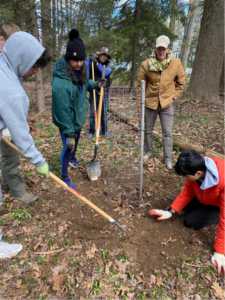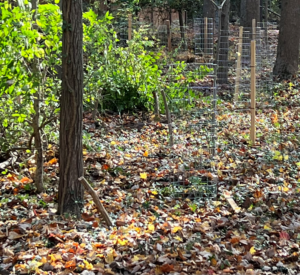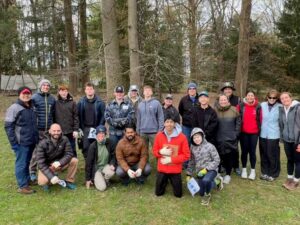
My name is Zane J, and I am an Eagle Scout from Troop 345 in the Wolf Trap District. I started the Distinguished Conservation Service Award (DCSA) to help the environment and the community.
I led a forestation and range management project in Glyndon Park in Vienna, VA. I noticed that as the park was developed over time, many trees and plant life were removed as a consequence. I also noticed the park has a significant number of older trees nearing their life span, and there were not many younger trees. Over time, the loss of trees harms the plants, animals, and overall ecosystem, and the park could benefit from having the next generation of plants installed. The first step I took was to plant native 136 native plants in Glyndon Park to bring younger native plants to the park. Planting new native species is crucial as they are better adapted to local conditions and can create a more diverse and resilient ecosystem. By increasing native plants in the area, I hope to bring more native birds, bees, butterflies, and overall more wildlife, which in turn will have a major benefit to the park’s health.
 However, planting native species was only the first step in park restoration, and the second part involved removing invasive species. It is a necessary part of this project to help the native plants thrive. Invasive species are known to outcompete native plants for resources, which can disrupt the balance of ecosystems and pose a serious threat to all wildlife within them. Removing invasive species at Glyndon Park will help ensure the park’s newly planted native species thrive in the future. Some of the invasive species removed that threatened native wildlife included English ivy, periwinkle, leatherleaf mahonia, wineberry, creeping euonymus, autumn olive, Japanese holly, Japanese honeysuckle, and barberry. I partnered with the local community, including schools, Scouts BSA, Girl Scouts, Nature Specialist Club, and the Town of Vienna. I worked with over 50 volunteers and this project had over 200 volunteer hours. Additionally, I educated over 140 people on the importance of forestation and range management.
However, planting native species was only the first step in park restoration, and the second part involved removing invasive species. It is a necessary part of this project to help the native plants thrive. Invasive species are known to outcompete native plants for resources, which can disrupt the balance of ecosystems and pose a serious threat to all wildlife within them. Removing invasive species at Glyndon Park will help ensure the park’s newly planted native species thrive in the future. Some of the invasive species removed that threatened native wildlife included English ivy, periwinkle, leatherleaf mahonia, wineberry, creeping euonymus, autumn olive, Japanese holly, Japanese honeysuckle, and barberry. I partnered with the local community, including schools, Scouts BSA, Girl Scouts, Nature Specialist Club, and the Town of Vienna. I worked with over 50 volunteers and this project had over 200 volunteer hours. Additionally, I educated over 140 people on the importance of forestation and range management.
The Scouting America’s DCSA program honors Scouts who carry out significant conservation projects with more rigorous requirements than a Scout BSA Eagle Scout project. To earn the award, Scouts must complete two supersize Scout environmentally-related projects. It requires the Scout to conduct in-depth research of a conservation issue; determine a solution; write a report; plan, execute, and lead a project; educate the community outreach; write final project reports; present their projects and findings before a conservation committee, and finally, earn seven conservation type merit badges.
My first conservation project focused on recycling tennis balls, and it was a success. Over 10,000 tennis balls were recycled, and the program I set up at Fairfax Racket Club continues to this day. I hope to inspire others to make a difference in their communities and positively impact the world.


